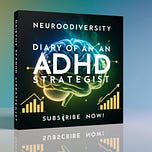I spent decades trying to repair a mind that was never broken. Every quirk, every struggle to fit in, every exhausting day pretending to process the world like everyone else—I mistook difference for deficiency.
My thoughts raced when others walked. My focus intensified on passions while floating away from expectations. My senses absorbed every detail, every emotion, every subtle shift in the room that others seemed to filter out effortlessly.
I called it my failure. The world called it a problem.
The diagnosis didn't come as a shock but as an illumination—suddenly casting light on the shadowed corners of my experiences. Not a label to confine me, but a framework to understand the operating system I'd been using all along.
That night, alone with this new knowledge, I felt the weight of self-blame begin to dissolve. The relief was physical—a lifetime of "what's wrong with me?" transformed into "so this is what's normal for me."
But knowing and becoming are bridges with very different architectures.
Understanding didn't immediately end the negative self-talk. The frameworks helped explain my past but didn't automatically reshape my future. I still found myself masking in professional settings, still apologizing for how my brain naturally functions.
I was caught between worlds—living in my thoughts about who I should be rather than experiencing who I am.
The real journey began when curiosity replaced criticism. What if my neurodivergence wasn't something to overcome but something to understand? What if the bridge I needed wasn't from "broken" to "fixed" but from external expectations to internal truth?
I started building my own crossing points. Small daily practices that connected my internal landscape to the external world without requiring translation.
Morning reflection—identifying one strength that comes from my neurodivergent perspective.
Midday permission—three moments to drop the mask and respond authentically.
Evening inventory—noting when I felt most at peace versus when I felt most pressured to conform.
These aren't solutions. They're handrails on a bridge I'm still constructing.
Some days I cross with confidence. Other days I barely make it halfway before retreating. The bridge sways with doubt when someone suggests I'm "using my diagnosis as an excuse" or that I should "just try harder to focus."
But gradually, I'm learning that embracing my neurodivergence isn't about limiting myself with labels—it's about freeing myself from expectations that were never designed for minds like mine.
The gift wasn't in discovering I'm neurodivergent. It was in discovering that my different lens on the world offers perspectives, connections, and possibilities that wouldn't exist otherwise.
My neurodivergence is both superpower and Achilles heel. Both gift and challenge. Both the source of my deepest struggles and my most unique contributions.
And in the space between societal expectations and my authentic experience, I'm finding a version of myself that no longer requires fixing—just understanding.
Maybe you're walking a similar path. Maybe you've felt the exhaustion of pretending to be neurotypical. Maybe you're tired of living in your thoughts about who you should be rather than experiencing who you are.
You're not a problem to be solved. Your brain isn't wrong—it's different. And different isn't deficient.
This journey isn't about becoming someone else. It's about becoming authentically, completely you—while building bridges that honor rather than hide your beautiful, complex mind.
I'm still constructing mine. Some days the work feels impossible. But with each plank I lay, I create more space for my true self to emerge.
What might your bridge look like?
If my words resonated with you and you'd like to join me on this journey of neurodivergent self-discovery, I share weekly reflections and practical bridge-building tools. Supporting this work allows me to continue creating resources for our community, but know that your presence alone enriches our shared understanding.
The most important truth I've learned: The bridge between who the world expects you to be and who you truly are isn't built by changing yourself—it's built by embracing yourself, completely and without apology.














Share this post